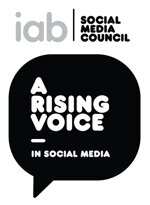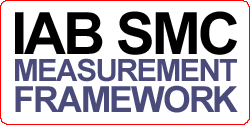, senior PR and marketing manager and head of social media council, IAB
This week we launched the IAB framework for social media measurement. Hopefully you’ve seen some of the coverage and the full presentation with all the details, but I thought I’d take some time just to give you a bit more background about why we came up with it, and what we hope having such a framework will achieve.
Why the IAB framework?
First and foremost the strength of the framework lies in its simplicity and memorability – a deliberate tactic to encourage wider adoption within the industry. Of course a lot of experienced practitioners have robust methodologies already in place to measure social, and we fully recognise that these are making a lot of clients very happy the world over! Our aim has never been to suggest the industry is measuring it in the wrong way, but rather in an inconsistent way across the board, which makes it difficult to compare or for the industry to grow as a whole. Read more…
Another month, another ‘Rising Voice in Social Media’ session, this time based around the concept of earned social media.
, commercial director at Unruly Media, took us through how to use viral to drive word of mouth citing case study examples from Durex, Nike and The Sun. Catch the presentation below.
, Managing Director of Diffusion provided insights on reputation management, how the PR industry has been turned on its head due to social media, and how to successfully protect your brand online whilst remaining approachable. Daljit’s slides are available below.
Reputation Management
, managing director of We are Social spoke on social media and customer service, including the trials and tribulations that come with using social media as a customer service channel with some great examples of how to do it right.
The IAB’s resident Paxman, , interviewed , commercial director at Unruly Media about what makes a successful viral campaign to dispel the myths that surround the area. Steve talks about what results clients are looking for from their campaigns using the Evian case study as a positive benchmark for brands, and what’s makes good creative.
Watch the below video to see the full interview…
By Tony Effik, chief strategy officer, Publicis Modem
 (Not necessarily the loudest!) Do you, like me, sometimes tire of all the noise in social media? As a group dedicated to the promotion of social media, we’re actually faced with quite a dilemma. Do we add to the hyperbole surrounding the discipline, while the substance suffers, or do we work together to contribute to a genuine future for social media? I think we’re all agreed on the latter.
(Not necessarily the loudest!) Do you, like me, sometimes tire of all the noise in social media? As a group dedicated to the promotion of social media, we’re actually faced with quite a dilemma. Do we add to the hyperbole surrounding the discipline, while the substance suffers, or do we work together to contribute to a genuine future for social media? I think we’re all agreed on the latter.
Which is why we’ve launched an initiative that’s purely dedicated to nurturing new talent – a practitioner programme for new starters, cutting through the hype and educating them about the realities of social media. You can book here to be a part of it, (unless places have been booked up already!)
As mentioned in my interview with the IAB previously, we have now set up the framework for the practitioner course, a first for the SMC council, starting on 19th April. The programme will cover key areas such as the definitions of social media, challenges of measurement, how to evaluate a campaign, measuring the importance of online engagement, brand and reputation management, social media display-planning and buying, legal regulations and privacy issues. The course will be spread over a series of five sessions all lasting 2 hours each, with a graduation (party!) on 12 August.
The main reason for creating this credential is because we believe as a council that it is vital to support young talent within social media in order for the business to mature and go from strength to strength. Our core objective in creating this course is to ‘turn the inexperienced into real experts within the social media space’ providing them with a clear perspective of what it’s really like to work within this side of the industry. Various IAB SMC members such as Tamar, RMM, We Are Social and have joined forces to produce a diverse curriculum for the delegates in order to achieve this.
Throughout the course the attendees will be expected to complete work outside the class room as well as blog about their learning process. Those delegates that complete the certificate will be awarded with a ‘Rising Voice in Social Media’ badge to showcase on their own blog once they have graduated.
The course is free for all IAB members and UK advertisers and spaces are going fast. Alternatively email to book your place!
by Harriet Clarke, communications executive, IAB

Tony Effik
is chief strategy officer at Publics Modem, and became chair of the social media council in November 2009 taking over from Lloyd Salmon, founder of Outside Line. I interviewed Tony to find out his future plans for the council, his feelings on its biggest achievements and his thoughts on the social media industry at the moment.
Why do you think the social media council is so important for the industry?
The social media industry can be a bit like Wild West terrain at times, with new comers occasionally entering into the industry under false pretence of a world full of ‘gold and riches’. Because of this misunderstood perception of the industry it can sometimes attract the wrong type of person. I think it is important for the SMC to work towards demystifying the discipline and achieving transparency, making it easier for new starters. I think this is crucial to maintain growth within the business.
What are your major aims and achievements for the next 12 months?
I am now a quarter of the way through my time as chair and in the first 3 months we have built a solid working structure for the council through establishing clear working groups and appointing ambassadors to manage these groups. Alongside this, we have also completed research into social media budgets which gives us a clearer understanding of where things need to go next and what needs to be done to achieve this. We have also finalised the framework of the practitioner course, a 2 hour session every 5 months aimed at new comers to nurture new talent.
Where would you like to see the council in the next 6-9 months?
Ideally it would be great if in the next 6-9 months the council could substantially aid transparency within the industry. It would be good if the knowledge and the brain power we have amongst us could get shared throughout the business, so more cross industry collaborations could occur. It would also be great to release a standard model that had been created by the SMC.
Why do you feel there was a need to create ambassadors for separate topics?
Social Media is so big, there is no way one person can be an expert at everything. Each individual council member has specialist skills in separate social media areas, and therefore I thought it would be best to unleash this expertise, it is also a good way of giving other members of the council recognition for the investment they make in the council.
How do you plan to further publicise the SMC within the industry?
We need to get the ambassadors out there. Talking, commenting, presenting, writing, and being interviewed. We need to do this in media that moves us out of our comfort zone. That means concentrating on building relationships with a wider range of media, and maintaining current relationships.
What is the council’s biggest achievement so far?
I think it would have to be the release of our recent research study which was conducted by research agency Opinion Matters. It showed the need for clarification over the role of social media and where it should fit within general business models, in order to make the most of the discipline. This research received a substantial amount of coverage within a lot of the major trade titles and online news sites, and was of real use to social media practitioners across the country. We hope to do this every year, and use it as a barometer of social media progress in the UK.
How do you feel the council can help the social media industry grow even further?
I think this can be achieved through creating a shared framework for the industry, promoting best practice and simplifying social media, making it easier to understand and less of a ‘scary’ prospect for those who are less experienced.
We need to create tools, and frameworks that become universal, and become standards. The more standards we create, and the more discipline we engender, the less of a Wild West frontier this all becomes. That will create growth.
by , senior PR and marketing manager, IAB
Following on from Henry’s blog post about Moira and Pam (which I swear to God is true, a friend of a friend who works at the BBC told me) we’re all about the #searchandsocialmedia at the moment. It’s becoming increasingly apparent when brands don’t have any control over (or knowledge of) what people are saying about them online, because it has an inevitable impact on their profile within the search listings.
In fact, in acknowledgment of this occasional short-sightedness, some brands can be quite quick to hop into their competitors search results pages. I feel bad for kicking them when they’re down, but Nestle have fallen victim to this with Greenpeace buying their name on Google (not Bing though, keep up guys!) because it’s a hot social media topic and search volumes have inevitably risen. Their PPC has the search result headline ‘Take a Break’ with the description “Which chocolate company destroys rainforests for palm oil?” Read more…
Fleur MD of Pass it On Media was interviewed by IAB’s senior PR and marketing manager, on social media influencers. This 10 minute video covers how to spot a worthwhile influencer, how influencers help campaigns and how they can be detrimental in a PR crisis. Fleur talks through the processes at Pass it On on how to recognize a worthwhile influencer, what tools they use for this and how important it is to keep an influencer fully involved with the campaign and be honest and transparent throughout the whole process in order to gain the best results.
At the end of the video Fleur also mentions her involvement with the IAB social media measurement sub group and how they are currently working towards setting actual usable metrics for the industry.
By Tom Ollerton, new business manager,
Skive
This is a presentation that I gave at the IAB Retail Forum (other presentations only available for IAB members). It gives an overview of the best and worst in class in this space as well as my view of the future of retail and social media.
By Iain MacMillan, RMM and the IAB Social Media Council education sub-group
When considering how to make best use of social technologies and media, it can be hard to know where to start. Making an organisation’s interactions amongst its employees, customers, enthusiasts or prospects more social can have numerous benefits -and can be achieved in many and various ways.
With this in mind, we believe a broad framework of social media activity types would be most beneficial – not only for those who lack experience in this area, but also for people for whom a simple check-list might be a useful aide memoire.
We’ve devised a list of six ways in which brands can use social technologies to impact upon a business’ marketing function.
Read more…
 The IAB’s social media and mobile councils have collaborated to produce a list of eleven things you need to know about mobile and social media.
The IAB’s social media and mobile councils have collaborated to produce a list of eleven things you need to know about mobile and social media.
1. Accelerating change. Whilst Gartner predicts that mobile will be the dominant form of web access worldwide by 2013, today, already, the combination of social and mobile is accelerating that trend, with nearly the same percentage of iPhone owners accessing Facebook through their mobile (71%) as through fixed line internet (77%).
(Ipsos, “The Future of Mobile” study, December 2009)
Steve Wing, Head of Mobile and Digital Attraction, Guardian
2. Social media and mobile are growing. It’s been predicted by eMarketer that mobile and social network users worldwide will grow more than fivefold between 2009 and 2014, rising from 141.4 million users in 2009 to 760.1 million in 2014.
Clark Turner, Editor, UTalk Marketing Read more…



